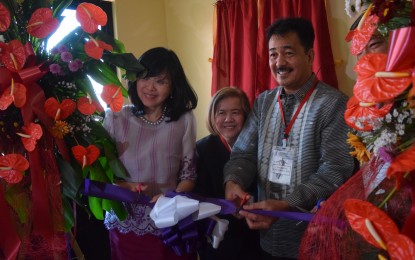
Commission on Higher Education Chairman Dr. J. Prospero De Vera III led the inauguration of the Biobank facility at the Philippine General Hospital with University of the Philippines (UP) Manila Chancellor Dr. Carmencita Padilla (left) and UP College of Medicine Dean Dr. Charlotte Chiong (right). It is a joint initiative of UP and the University of California-San Francisco funded through the CHED Philippine-California Advanced Research Institutes. (Photo courtesy of CHED)
MANILA -- Universities nationwide can now perform high-level research for cancer cure.
The Commission on Higher Education (CHED) said the Cancer Phenome-Biobanking System and Biomonitoring Program at the Philippine General Hospital would help local researchers find a cure for cancer through biobanking, a process of collecting samples of biological specimens, such as cells and tissues, to aid researchers understand a certain disease and help in developing drugs.
“A biobank extends beyond the function of being a long-term storage and conservation facility for biological specimens. In other countries, such facilities have contributed to pioneering medical advances, including precision medicine—a method which allows a clinician to tailor a specific treatment for a particular patient. Initiatives such as this largely impact our country’s health system,” CHED Chairman J. Prospero de Vera III said in a statement.
The Biobank facility is a joint initiative of the University of the Philippines and the University of California-San Francisco (UCSF) funded through the CHED Philippine-California Advanced Research Institutes (PCARI) through the Institute for Health Innovation and Translational Medicine.
It was launched Monday, February 18.
PCARI, a CHED project, brings together top scientists, researchers and faculty of Philippine universities and the University of California to conduct joint research, faculty exchanges, scholarships and training on issues and problems facing the country.
De Vera said the facility would produce data that would help policymakers.
“Universities must help provide evidence-based policy recommendations to government agencies such as the Department of Health or guide Congress in its enactment of new laws. Universities must do all these in a collaborative manner so they can harness the expertise in a cost-effective manner,” he added.
Dr. Michael Velarde, project leader of the biobank facility, said the new biobank would house data on cancer types, blood analysis, pathologic data, and other relevant patient information without compromising patient confidentiality.

It would focus on endometrial, breast, and ovarian cancers commonly affecting women during its initial cycle, he added.
“This will have two components. The human cell repository system will involve isolation and culturing of cancer cells from Filipino patients. Information will be stored in an online database which medical professionals and researchers can use for testing and developing new drugs. The biomonitoring project, on the other hand, will involve sampling of Filipino individuals and analyzing whether exposure of patients to certain chemicals is associated with higher risk of developing cancer,” he said.
While cancer is a genetic disease, Velarde stressed that there are external factors that also drive cancer progression.
"These are endocrine disrupting chemicals (EDCs) found in agricultural pesticides, commercial food packaging, and many household and personal care products, including anti-bacterial soaps, toothpaste, cosmetics, plastic bottles, kids’ toys, and PVC plastics," he added.
Top killer disease
According to a 2016 data of the Philippine Statistics Authority (PSA), cancer is one of the top three killer diseases in the country.
PSA reported that more Filipino women die from cancer, listing as many as 30,954 annual cases.
Among the types of cancer, breast cancer has the highest incidence rate in the Philippines among Asian countries.
It also reported that patients from developing countries such as the Philippines, where 21.6 percent of the population are below the national poverty line, are faced with the burden of paying for the high cost of drugs, surgeries, and chemotherapy/ radiotherapy. The high mortality rate in the country calls for new and better diagnostic methods and therapeutic interventions.
De Vera said the facility is one of the investments of President Rodrigo R. Duterte's administration on health research and innovation.
"(The)Duterte administration continues to fund higher education at levels never before done by any administration. CHED continues to encourage higher education institutions to conduct researches that will provide solutions to health problems that affect the lives of Filipinos as we need research to provide solutions such as identifying products we should avoid or regulate, lifestyle changes we should do, or helping find a cure for cancer," he added. (PNA)
